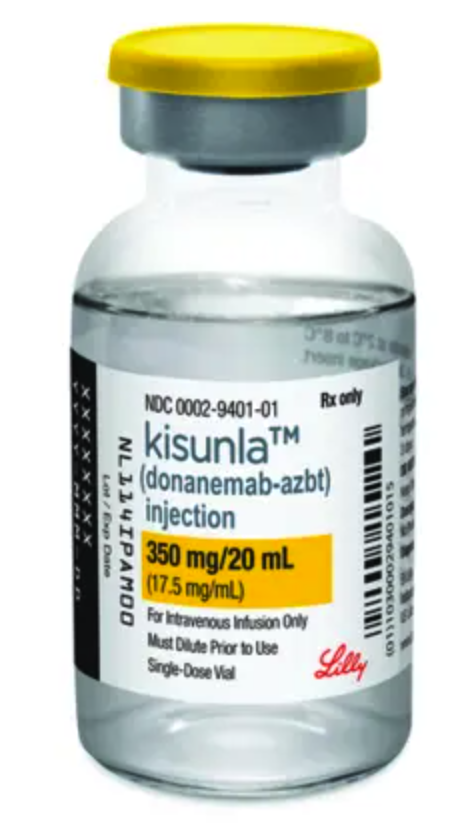FDA Approves Second Alzheimer Disease Infusion Therapy
Images

The FDA has approved Eli Lilly’s Kisunla (donanemab-azbt) injection for the treatment of Alzheimer disease in patients with mild cognitive impairment or mild dementia stage of disease, the population in which treatment was studied in the clinical trials. Kisunla is administered as an intravenous infusion every four weeks.
"Kisunla demonstrated very meaningful results for people with early symptomatic Alzheimer disease, who urgently need effective treatment options. We know these medicines have the greatest potential benefit when people are treated earlier in their disease, and we are working hard in partnership with others to improve detection and diagnosis," said Anne White, executive vice president and president of Lilly Neuroscience, Eli Lilly and Company. "Our deepest thanks to the patients and their loved ones for participating in our clinical programs and to Lilly scientists and collaborators persevering over decades of research. Each year, more and more people are at risk for this disease, and we are determined to make life better for them."
The efficacy of Kisunla was evaluated in a double-blind, placebo-controlled, parallel-group study (Study 1, NCT04437511) in patients with Alzheimer disease. The patients had confirmed presence of amyloid pathology and mild cognitive impairment or mild dementia stage of disease. 1736 patients were randomized 1:1 to receive 700 mg Kisunla every 4 weeks for the first 3 doses, and then 1400 mg every 4 weeks (N = 860) or placebo (N = 876) for a total of up to 72 weeks. The treatment was switched to placebo based on a prespecified reduction in amyloid levels measured by positron emission tomography (PET) at Week 24, Week 52, and Week 76.
Patients treated with Kisunla demonstrated a statistically significant reduction in clinical decline on the Integrated Alzheimer's Disease Rating Scale (iADRS) compared to placebo at Week 76 in the overall population (2.92, p<0.0001), as well as on the iADRS component scales, the Alzheimer’s Disease Assessment Scale-Cognitive subscale (ADAS-Cog13) (-1.33, p=0.0006) and the Alzheimer’s Disease Cooperative Study – instrumental Activities of Daily Living (ADCS- iADL) scale (1.70, p=0.0001). Patients treated with Kisunla also demonstrated a statistically significant reduction in clinical decline on the Clinical Dementia Rating Scale – Sum of Boxes (CDR-SB) compared to placebo at Week 76 in the overall population (-0.70, p<0.0001).
At baseline, the study population had a mean age of 73 years, with a range of 59 to 86 years. Fifty-seven percent of patients were female, 91% were White, 6% were Asian, 4% were Hispanic or Latino, and 2% were Black or African American.
As with the approval for Leqembi, the prescribing information includes a boxed warning for amyloid-related imaging abnormalities (ARIA). ARIA most commonly presents as temporary swelling in areas of the brain that usually resolves over time and may be accompanied by small spots of bleeding in or on the surface of the brain. ARIA usually does not have symptoms, although serious and life-threatening events rarely can occur.
Patients who are ApoE ε4 homozygotes have a higher incidence of ARIA, including symptomatic and serious ARIA, compared to heterozygotes and noncarriers. Testing for ApoE ε4 status should be performed prior to beginning treatment to inform the risk of developing ARIA.
There is risk of infusion-related reactions, with symptoms such as flu-like symptoms, nausea, vomiting and changes in blood pressure, and hypersensitivity reactions, including anaphylaxis (severe, life-threatening allergic reaction) and angioedema (swelling).
The most common side effects of Kisunla were ARIA and headache.